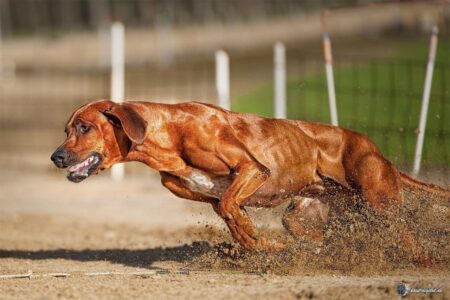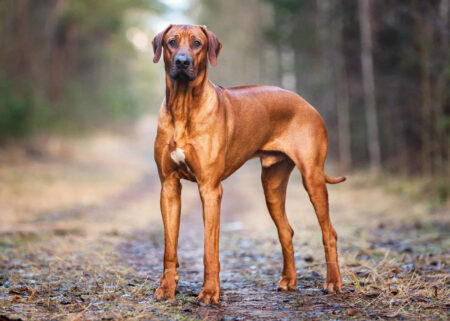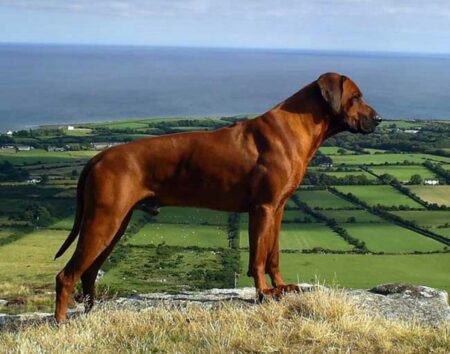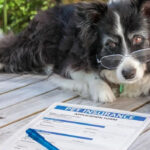The Rhodesian Ridgeback, often referred to as the “Lion Hunter,” is a distinctive and powerful breed of dog known for its unique physical traits and historical role as a hunting companion in Southern Africa. This breed is characterized by a distinctive ridge of hair along its back, which grows in the opposite direction to the rest of its coat. The breed’s origin can be traced back to the southern part of the African continent, particularly to the region that is now known as Zimbabwe, formerly Rhodesia, where it earned its name.
Apart from its hunting prowess, the Rhodesian Ridgeback is also known for its loyal and affectionate nature towards its human family. It is a versatile dog that adapts well to family life, displaying a calm and gentle demeanor when properly socialized and trained.
In contemporary times, the Rhodesian Ridgeback has transitioned from its role as a lion hunter to that of a beloved companion, excelling in various canine activities such as obedience, agility, and even competitive dog sports. This breed’s distinctive appearance, combined with its noble and dignified demeanor, has contributed to its popularity among dog enthusiasts worldwide.
Overview of Rhodesian Ridgeback: The Lion Hunter
The Rhodesian Ridgeback is a large, muscular breed known for its distinctive ridge of hair along its back. They were originally bred in Southern Africa as hunting dogs, specifically for tracking and chasing lions. They have a strong prey drive and are fearless, making them excellent guardians and protectors. Rhodesian Ridgebacks are known for their loyalty, intelligence, and athleticism.
Height: Males typically stand between 25-27 inches at the shoulder, while females stand 24-26 inches.
Weight: The average weight for males is 85-90 pounds, while females weigh between 65-70 pounds.
Lifespan: The average lifespan of a Rhodesian Ridgeback is 10-12 years.
Colors: The Rhodesian Ridgeback comes in a range of colors, including light wheaten, red wheaten, and varying shades of brown. They may also have a black or blue mask on their face.
Temperament: Rhodesian Ridgebacks are known for being confident, independent, and intelligent. They can be reserved with strangers, but are loyal and devoted to their families. They have a strong instinct to protect and may be wary of other dogs or animals, so early socialization is important. They require firm, consistent hand-in training and may not be suitable for first-time dog owners.
Grooming: The Rhodesian Ridgeback has a short, dense coat that is easy to maintain. They shed moderately and only require occasional brushing to remove loose hair. They also have a minimal doggy odor and only need occasional baths.
Exercise: As hunting dogs, Rhodesian Ridgebacks have plenty of energy and require daily exercise to stay physically and mentally healthy. They excel at activities like running, hiking, and agility training. Without proper exercise, they may become destructive or develop behavioral issues.
Training: Rhodesian Ridgebacks are intelligent, but can also be stubborn and independent. They require consistent and firm training with positive reinforcement techniques. They may have a strong prey drive, so training and socialization should begin at a young age to prevent chasing behavior.
Are Rhodesian Ridgebacks Good With Kids?
Yes, Rhodesian Ridgebacks are generally good with kids. They are a loyal and protective breed, making them great family dogs. However, they may not do well with toddlers or small children, as their large size and high energy may accidentally knock over or intimidate young children. It is important to supervise interactions between children and any dog breed and to teach children how to properly interact with and handle dogs to ensure a safe and positive relationship. Additionally, socialization and training from a young age are important to help the Rhodesian Ridgeback learn appropriate behavior and interactions with children.
The History of Rhodesian Ridgeback Dog Breeds
The Rhodesian Ridgeback is a large, muscular dog breed that originated in Southern Africa. They were originally bred by the Khoikhoi and San indigenous peoples for hunting and protection.
In the late 19th century, European settlers in Rhodesia (now Zimbabwe) crossed these indigenous dogs with European breeds such as Great Danes, Bloodhounds, and Greyhounds to create a larger, more versatile hunting and guarding dog.
The resulting breed became known as the Rhodesian Ridgeback, named after the distinctive ridge of hair along their back. This feature was highly valued by the breed’s original creators, as it served as a natural protective shield against predators in the rugged African terrain.
Throughout the 20th century, Rhodesian Ridgebacks were used for a variety of tasks, including hunting lions and other large game, guarding farms and homesteads, and serving as companions and protection for their owners.
In the late 1920s, the breed was officially recognized by the South African Kennel Union, and in the 1950s, the Rhodesian Ridgeback Club of South Africa was formed to promote and preserve the breed.
The breed was introduced to the United States in the 1950s and was recognized by the American Kennel Club in 1955. Since then, Rhodesian Ridgebacks have become increasingly popular as both show dogs and loyal family companions.
Today, the Rhodesian Ridgeback remains a popular breed around the world and is known for its intelligence, athleticism, and loyal nature. They are often used as therapy dogs, search and rescue dogs, and in other working roles. However, they are still prized for their hunting abilities and are a popular choice for game hunters in Africa and beyond.
10 Most Popular Rhodesian Ridgeback Mixes
- Labradoodle (Rhodesian Ridgeback x Poodle mix)
- Doberman Pinscher (Rhodesian Ridgeback x Doberman mix)
- Pitbull (Rhodesian Ridgeback x Pitbull mix)
- German Shepherd (Rhodesian Ridgeback x German Shepherd mix)
- Golden Retriever (Rhodesian Ridgeback x Golden Retriever mix)
- Boxer (Rhodesian Ridgeback x Boxer mix)
- Great Dane (Rhodesian Ridgeback x Great Dane mix)
- Rottweiler (Rhodesian Ridgeback x Rottweiler mix)
- Husky (Rhodesian Ridgeback x Husky mix)
- Australian Shepherd (Rhodesian Ridgeback x Australian Shepherd mix)
Characteristics of Rhodesian Ridgeback Dogs
- Appearance: Rhodesian Ridgebacks are large, muscular dogs with a distinctive ridge of hair running along their back. They have a short, dense coat that can be a range of colors including light wheaten to red wheaten. They have a broad head and powerful jaws, and their ears are medium-sized and folded forward.
- Size: On average, male Rhodesian Ridgebacks stand at 25-27 inches tall at the shoulder and weigh between 85-90 pounds. Females are slightly smaller, standing at 24-26 inches tall and weighing 70-75 pounds.
- Temperament: Rhodesian Ridgebacks are known for their even-tempered, confident, and loyal nature. They are fiercely protective of their family and can be somewhat aloof with strangers. They have a strong prey drive and will chase small animals if not properly trained and socialized.
- Exercise Needs: These dogs were originally bred for hunting, so they have high energy levels and require daily exercise to stay healthy and happy. They make great running or hiking companions and also enjoy playing games like fetch and tug-of-war.
- Training: Rhodesian Ridgebacks are intelligent and eager to please, but they can also be stubborn and independent. Positive reinforcement training methods work best with this breed, as they can be sensitive to harsh corrections. Early and consistent training is important to prevent any potential dominance or aggression issues.
- Health: Overall, Rhodesian Ridgebacks are a healthy breed with a life expectancy of 10-12 years. However, like all breeds, they are prone to certain health conditions such as hip and elbow dysplasia, bloat, and some cancers.
- Grooming: The short coat of a Rhodesian Ridgeback is relatively low maintenance, only requiring a weekly brushing to remove any loose hair or dirt. They shed moderately year-round and do not have a strong doggy odor.
- Living Situation: These dogs are not well-suited for apartment living as they need plenty of space to run and play. They do best in homes with large, fenced-in yards where they can expend their energy. They also thrive in homes with active families who can provide them with daily exercise and mental stimulation.
- Sociability: While naturally protective and aloof with strangers, Rhodesian Ridgebacks are generally good-natured and get along well with children and other family pets when properly socialized. They may be reserved or cautious around unfamiliar dogs and should always be supervised when interacting with other animals.
- Considerations: Due to their protective nature and high prey drive, Rhodesian Ridgebacks may not be the best fit for first-time dog owners. They require an experienced and confident handler who can provide them with proper training and socialization. Additionally, they may not do well with small pets, such as cats, as they have a strong instinct to chase.
The Appearance of Rhodesian Ridgeback Dogs
Rhodesian Ridgeback dogs are medium to large-sized dogs, with a muscular and athletic build. They typically stand between 24-27 inches tall at the shoulder and can weigh between 70-85 pounds.
They have a short, smooth coat that comes in a range of colors, from light wheaten to red or mahogany. They may have white markings on the chest and toes, but excessive white is a disqualification in the show ring.
One of the most distinctive features of Rhodesian Ridgebacks is the ridge of hair that runs down their back in the opposite direction of the rest of their coat. This ridge is caused by a line of hair growing in the opposite direction and typically has a “crown” at the top.
Their heads are broad and flat, with a well-defined stop and a tapered muzzle. They have dark, almond-shaped eyes and a black or liver-colored nose, depending on the color of their coat.
Their ears are medium-sized and either folded downwards or erect, with a slight forward tilt. Their tails are long and taper to a point, reaching down to their hocks.
Temperament of Rhodesian Ridgeback
The Rhodesian Ridgeback is a breed known for its loyal, confident, and energetic temperament. They were originally bred in Africa for hunting and protecting their owners and are known for their bravery and determination.
These dogs are highly intelligent and independent but also have a strong desire to please their owners. They are typically calm and even-tempered but also have a playful and energetic side.
Rhodesian Ridgebacks are affectionate and loving towards their family but can be aloof and reserved with strangers. They are known to be protective and make excellent watchdogs, but proper socialization is important to ensure they do not become overly wary or aggressive towards strangers.
This breed does well with children and can be a great family dog, but may not tolerate rough play or teasing. They also have a high prey drive and may not do well with small animals, so proper introductions and supervision are important.
Due to their strong will and independence, Rhodesian Ridgebacks may not be suited for first-time dog owners. They require consistent and firm training from an early age to prevent any stubborn or dominant behaviors.
SEE ALSO: Reasons Why You Should Get Pet Insurance for Dogs
Health Risks of Rhodesian Ridgeback Dogs
- Hip and Elbow Dysplasia: Rhodesian Ridgebacks are prone to hip and elbow dysplasia, a hereditary condition that affects the joints and can lead to pain, lameness, and arthritis. This condition can be managed with medication, physical therapy, and potentially surgery, but it can significantly impact a dog’s quality of life.
- Dermoid Sinus: Dermoid sinus is a congenital condition that can affect Rhodesian Ridgebacks. It is a type of abnormal opening or tract in the skin, which can be prone to infection and may require surgical removal.
- Gastric Dilatation-Volvulus (GDV): Rhodesian Ridgebacks, like many large and deep-chested breeds, are at an increased risk for developing GDV, also known as bloat. This condition occurs when the stomach twists and traps gas and food, leading to bloating and potentially life-threatening conditions if not treated promptly.
- Canine Lymphoma: Rhodesian Ridgebacks have a higher risk of developing lymphoma compared to other breeds. This type of cancer affects the lymphatic system and can lead to serious health complications and even death if left untreated.
- Hypothyroidism: Rhodesian Ridgebacks can also be prone to hypothyroidism, a condition in which the thyroid gland does not produce enough hormones. This can affect a dog’s metabolism, energy levels, and overall health and may require lifelong medication to manage.
- Progressive Retinal Atrophy (PRA): PRA is a degenerative eye disorder that can cause vision loss in Rhodesian Ridgebacks. While there is no cure for PRA, there are ways to help manage the condition and preserve a dog’s vision.
- Allergies: Like many breeds, Rhodesian Ridgebacks can experience allergies, which can cause symptoms such as itching, licking, and skin irritation. Allergies can be managed with medication and by identifying and avoiding the trigger.
- Ear Infections: Rhodesian Ridgebacks have floppy ears, which can make them more prone to ear infections. Regular ear cleaning and proper grooming can help prevent these infections from occurring.
- Cancer: Aside from lymphoma, Rhodesian Ridgebacks are also at an increased risk for developing other types of cancer, such as mast cell tumors and osteosarcoma. Early detection and treatment are crucial for a successful outcome.
- Heat Intolerance: Rhodesian Ridgebacks may struggle in hot weather due to their heavy, dense coats. They are also a breed that is more prone to overheating and heat stroke, so it’s essential to monitor them and provide plenty of water and shade when outdoors.
Cost of Rhodesian Ridgeback Dogs
The cost of a Rhodesian Ridgeback puppy can range from $1,500 to $2,500, depending on factors such as the breeder, location, and pedigree of the dog. Older dogs or those from champion bloodlines can cost upwards of $3,000.
It’s important to note that the initial cost of a Rhodesian Ridgeback is only the beginning of the expenses associated with owning a dog. Other costs to consider include food, vet bills, training, grooming, and supplies. It’s estimated that the average cost of owning a dog, including all of these expenses, is around $1,400 per year.
Additionally, it’s important to research the breeder and ensure they are reputable and ethical. A responsible breeder will have health clearances for their dogs and will be able to provide information on the dog’s lineage and health history. Choosing a reputable breeder may cost more initially, but it can save you money in the long run by ensuring you have a healthy and well-bred dog.
African Dogs That Hunt Lions
- African Wild Dog
- Ethiopian Wolf
- Cape Hunting Dog
- Caracal
- Spotted Hyaena
- Golden Jackal
- African Lion Dog
- Sloughi
- Dogo Argentino
- Rhodesian Ridgeback
How To Take Care of Rhodesian Ridgeback Dogs
The Rhodesian Ridgeback is a large, muscular, and active breed of dog known for its distinct “ridge” of hair along its back. originally bred to hunt large game in Africa, they are now popular family pets due to their loyal and protective nature. As with any breed, proper care and attention are essential to keep your Ridgeback happy and healthy. Here are some tips for taking care of a Rhodesian Ridgeback:
- Exercise: Rhodesian Ridgebacks are an energetic breed that requires daily exercise to keep them physically and mentally stimulated. They have a high endurance level and love to run, so a fenced-in yard or regular walks are important for their well-being. They also excel at activities such as hiking, agility, and fetch.
- Grooming: The Ridgeback’s short, sleek coat does not require much grooming, but they do shed moderately year-round. A weekly brushing with a slicker brush can help to remove loose hair and distribute natural oils, keeping their coat healthy and shiny. They will also only need occasional baths, typically when they become dirty or smelly.
- Nutrition: A high-quality diet is essential for the overall health and well-being of a Rhodesian Ridgeback. Opt for a food that is specifically formulated for large breed dogs with high levels of protein to support their active lifestyle. It is important to monitor their food intake and keep an eye on their weight, as they are prone to obesity if overfed.
- Training and Socialization: As with any breed, early socialization and training are crucial for a Rhodesian Ridgeback. They are intelligent and independent dogs that can be strong-willed, so consistent and positive training methods are recommended. They can also be reserved with strangers, so it is important to socialize with them from a young age to prevent potential behavior issues.
- Veterinary Care: Regular visits to the veterinarian are important for maintaining your Rhodesian Ridgeback’s health. They should receive annual check-ups, vaccinations, and preventative care for common health issues such as hip dysplasia and hypothyroidism. It is also important to keep up with regular parasite prevention, such as heartworm medication and flea and tick prevention.
- Mental Stimulation: Along with physical exercise, Rhodesian Ridgebacks also require mental stimulation to prevent boredom and destructive behavior. Puzzle toys and interactive playtime can help keep them mentally stimulated and prevent them from getting into mischief.
- Supervision and Safety: Due to their protective nature, it is important to supervise your Rhodesian Ridgeback when they are around unfamiliar people or animals. They can be wary of strangers and may show aggression if they feel their family is in danger. Proper socialization and training can help prevent any potential issues.
By following these tips and giving your Rhodesian Ridgeback the love and attention they deserve, you can ensure that they live a happy and healthy life as a cherished member of your family.
SEE ALSO: Are Chow Chows Hypoallergenic?
FAQs
Q. Did Rhodesian Ridgebacks hunt lions?
A. Yes, Rhodesian Ridgebacks were originally bred in Africa to hunt lions. In the late 19th century, the breed was developed in Southern Africa by crossing various breeds of European dogs with the local African Hottentot Hunting Dogs.
Q. Who would win Lion or Rhodesian Ridgeback?
A. In a fight between a lion and a Rhodesian Ridgeback, the lion would almost certainly win. Rhodesian Ridgebacks are bred for tracking and guarding, not for fighting, and a single dog would not stand much of a chance against a fully-grown lion.
Q. Are Rhodesian Ridgebacks good hunters?
A. Rhodesian Ridgebacks were originally bred to be excellent hunters, and today they are still known for their hunting abilities.
Q. What kind of dog chases lions in Africa?
A. In Africa, there is a dog known as the Rhodesian Ridgeback that is bred specifically to chase lions.
Q. How many Rhodesian Ridgebacks can kill a lion?
A. The short answer is that it would take a lot of Rhodesian Ridgebacks to kill a lion. A Rhodesian Ridgeback is a large and powerful dog, but a lion is an apex predator that weighs several times more than even the largest Rhodesian Ridgeback.
Conclusion
The Rhodesian Ridgeback is a majestic and powerful breed, known for its history of hunting lions in their native Africa. These dogs possess a unique ridge on their backs and a courageous and determined nature that suits them well for their role as lion hunters.
While their hunting skills are not commonly used today, the Rhodesian Ridgeback continues to leave a lasting impression on their owners and those lucky enough to meet them. Their regal appearance and rich history make them a beloved breed, admired for their strength, courage, and loyalty.


